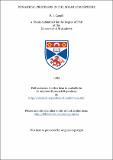Dynamical processes in the solar atmosphere
Abstract
It has become clear that the closed-field regions of the solar atmosphere are not static (as was once thought) but that many types of steady and unsteady flows and other dynamical, processes such as flares are continually occurring, in them. This thesis investigates some theoretical aspects of these dynamical phenomena. Steady, one-dimensional flow along a coronal loop is investigated first of all. Such a flow may be driven by a pressure difference between the foot points, and a wide range of shocked and unshocked flows are found. The presence of steady flows removes the symmetry present in most static loop models, and these models are shown to form only one class of a much wider range of dynamic solutions to the equations of motion. Thermal non-equilibrium in hot coronal loops occurs if the pressure in a loop becomes too big. The non-linear evolution of this non-equilibrium state is followed, and the loop is found to cool from of order 10[super]6 K to below 10[super]5 K in a few hours. An upflow is driven, and non-equilibrium is suggested as a means of formation of either cool loop cores or prominences. Thermal non-equilibrium is also discussed as a possible mechanism for the simple-loop flare. It is suggested that a cool equilibrium at a temperature of a few times 10[super]4 K can flare to over. 10[super]7 K if the mechanical heating in the cool loop becomes too large. The evolution is followed and the loop is found to flare to over 10[super]7 K in approximately 5 minutes. Magnetohydrodynamic shock waves have long been regarded as a potentially efficient heating mechanism. Their behaviour is re-examined here, and it is found that certain types of shock can release very large amounts of energy. These results are then applied to the heating of "post"-flare loops, for which temperatures of 10[super]7 K at the loop summit may be obtained. Finally, some solutions of the magnetostatic equation are discussed, and it is pointed out that if the gas pressure is too big then magnetostatic equilibrium will break down. It is suggested that the subsequent evolution may give rise to a surge or other mass ejection.
Type
Thesis, PhD Doctor of Philosophy
Collections
Items in the St Andrews Research Repository are protected by copyright, with all rights reserved, unless otherwise indicated.

